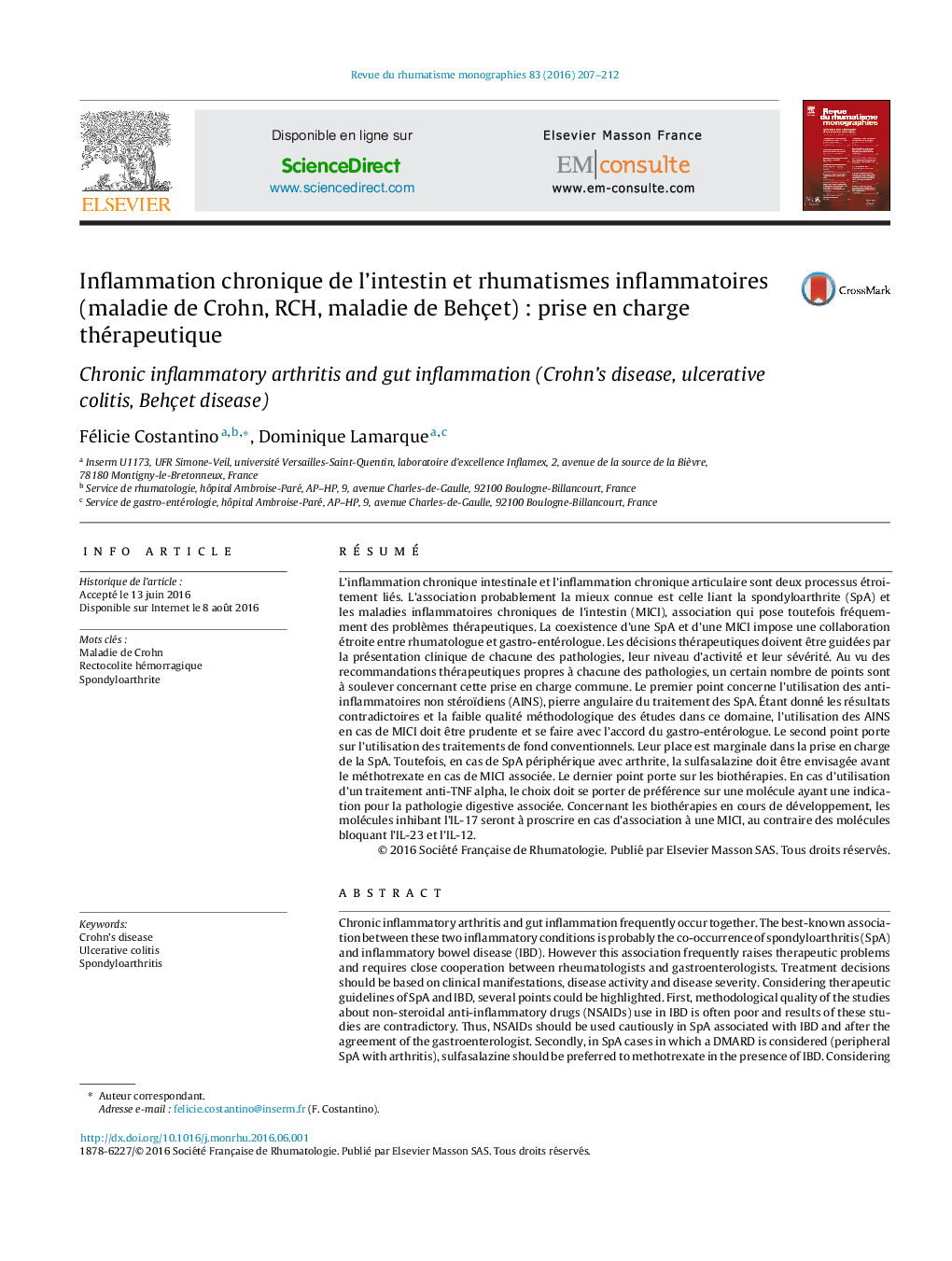| کد مقاله | کد نشریه | سال انتشار | مقاله انگلیسی | نسخه تمام متن |
|---|---|---|---|---|
| 3389696 | 1407999 | 2016 | 6 صفحه PDF | دانلود رایگان |

RésuméL’inflammation chronique intestinale et l’inflammation chronique articulaire sont deux processus étroitement liés. L’association probablement la mieux connue est celle liant la spondyloarthrite (SpA) et les maladies inflammatoires chroniques de l’intestin (MICI), association qui pose toutefois fréquemment des problèmes thérapeutiques. La coexistence d’une SpA et d’une MICI impose une collaboration étroite entre rhumatologue et gastro-entérologue. Les décisions thérapeutiques doivent être guidées par la présentation clinique de chacune des pathologies, leur niveau d’activité et leur sévérité. Au vu des recommandations thérapeutiques propres à chacune des pathologies, un certain nombre de points sont à soulever concernant cette prise en charge commune. Le premier point concerne l’utilisation des anti-inflammatoires non stéroïdiens (AINS), pierre angulaire du traitement des SpA. Étant donné les résultats contradictoires et la faible qualité méthodologique des études dans ce domaine, l’utilisation des AINS en cas de MICI doit être prudente et se faire avec l’accord du gastro-entérologue. Le second point porte sur l’utilisation des traitements de fond conventionnels. Leur place est marginale dans la prise en charge de la SpA. Toutefois, en cas de SpA périphérique avec arthrite, la sulfasalazine doit être envisagée avant le méthotrexate en cas de MICI associée. Le dernier point porte sur les biothérapies. En cas d’utilisation d’un traitement anti-TNF alpha, le choix doit se porter de préférence sur une molécule ayant une indication pour la pathologie digestive associée. Concernant les biothérapies en cours de développement, les molécules inhibant l’IL-17 seront à proscrire en cas d’association à une MICI, au contraire des molécules bloquant l’IL-23 et l’IL-12.
Chronic inflammatory arthritis and gut inflammation frequently occur together. The best-known association between these two inflammatory conditions is probably the co-occurrence of spondyloarthritis (SpA) and inflammatory bowel disease (IBD). However this association frequently raises therapeutic problems and requires close cooperation between rheumatologists and gastroenterologists. Treatment decisions should be based on clinical manifestations, disease activity and disease severity. Considering therapeutic guidelines of SpA and IBD, several points could be highlighted. First, methodological quality of the studies about non-steroidal anti-inflammatory drugs (NSAIDs) use in IBD is often poor and results of these studies are contradictory. Thus, NSAIDs should be used cautiously in SpA associated with IBD and after the agreement of the gastroenterologist. Secondly, in SpA cases in which a DMARD is considered (peripheral SpA with arthritis), sulfasalazine should be preferred to methotrexate in the presence of IBD. Considering TNF-blockade treatments, molecules indicated in both SpA and IBD should be preferred. Several other biologic therapies are in development in SpA and IBD. Blockade of IL-17 should be avoided in IBD whereas blockade of IL-23/IL-12 seems to be effective in both SpA and IBD.
Journal: Revue du Rhumatisme Monographies - Volume 83, Issue 4, September 2016, Pages 207–212